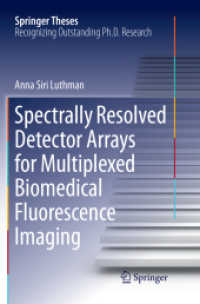- ホーム
- > 洋書
- > ドイツ書
- > Humanities, Arts & Music
- > Linguistics
- > english linguistics
Full Description
From Orientalism to Cultural Capital presents a fascinating account of the wave of Russophilia that pervaded British literary culture in the early twentieth century. The authors bring a new approach to the study of this period, exploring the literary phenomenon through two theoretical models from the social sciences: Orientalism and the notion of «cultural capital» associated with Pierre Bourdieu. Examining the responses of leading literary practitioners who had a significant impact on the institutional transmission of Russian culture, they reassess the mechanics of cultural dialogism, mediation and exchange, casting new light on British perceptions of modernism as a transcultural artistic movement and the ways in which the literary interaction with the myth of Russia shaped and intensified these cultural views.
Contents
CONTENTS: Philip Ross Bullock: Preface - The East Wind of Russianness - John Galsworthy: Is It Possible to «De-Anglicise the Englishman»? - H. G. Wells: Interpreting the «Writing on the Eastern Wall of Europe» - J. M. Barrie and The Truth about the Russian Dancers - D. H. Lawrence: «Russia Will Certainly Inherit the Future» - «Lappin and Lapinova»: Woolf's Beleaguered Russian Monarchs - «Not a Story of Detection, of Crime and Punishment, but of Sin and Expiation»: T. S. Eliot's Debt to Russia, Dostoevsky and Turgenev.







